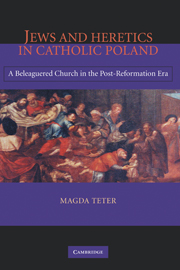Book contents
- Frontmatter
- Contents
- List of Illustrations
- Preface and Acknowledgments
- Note on Terms, Spelling, and Translations
- Abbreviations
- JEWS AND HERETICS IN CATHOLIC POLAND
- Introduction
- 1 “One Mystical Body … Only One Shepherd”: The Church Ideals of Social Order
- 2 The Upset Social Order: Nobles and the Jews in Poland
- 3 Heresy and the Fleeting “Triumph of the Counter-Reformation”
- 4 “Bad and Cruel Catholics”: Christian Sins and Social Intimacies Between Jews and Christians
- 5 “A Shameful Offence”: The Nobles and Their Jews
- 6 “Countless Books Against Common Faith”: Catholic Insularity and Anti-Jewish Polemic
- 7 “Warding Off Heretical Depravity”: “Whom Does the Catholic Church Reject, Condemn and Curse?”
- Conclusion: Did the Counter-Reformation Triumph in Poland?
- Glossary
- Notes
- Selected Bibliography
- Index
6 - “Countless Books Against Common Faith”: Catholic Insularity and Anti-Jewish Polemic
Published online by Cambridge University Press: 12 January 2010
- Frontmatter
- Contents
- List of Illustrations
- Preface and Acknowledgments
- Note on Terms, Spelling, and Translations
- Abbreviations
- JEWS AND HERETICS IN CATHOLIC POLAND
- Introduction
- 1 “One Mystical Body … Only One Shepherd”: The Church Ideals of Social Order
- 2 The Upset Social Order: Nobles and the Jews in Poland
- 3 Heresy and the Fleeting “Triumph of the Counter-Reformation”
- 4 “Bad and Cruel Catholics”: Christian Sins and Social Intimacies Between Jews and Christians
- 5 “A Shameful Offence”: The Nobles and Their Jews
- 6 “Countless Books Against Common Faith”: Catholic Insularity and Anti-Jewish Polemic
- 7 “Warding Off Heretical Depravity”: “Whom Does the Catholic Church Reject, Condemn and Curse?”
- Conclusion: Did the Counter-Reformation Triumph in Poland?
- Glossary
- Notes
- Selected Bibliography
- Index
Summary
In western europe during the post-reformation period, catholic and Protestant scholars engaged in a scholarly, often ethnographic study of the Jewish religion, and produced competent, if still polemical, works grounded in Jewish sources. But in Poland in the eighteenth century, despite its brief Renaissance of the early sixteenth century, some Catholic clergy were still writing of Jewish thirst for Christian blood in a manner reminiscent of medieval works. In religious rhetoric, as in the ideas of Church hierocracy, Poland froze in time while the outside world moved on. The Polish Catholic Church's reaction to the new religious ideas of the Reformation, including its control of the dissemination of knowledge through restrictions on printing and education, contributed to the cultural insularity of Poland and the Polish Catholic Church, and prevented its clergy, and others, from benefiting from, and participating in, western European Christian scholarship.
Polish clergy's writings continued to raise ritual murder accusations and blood libels against Jews as late as the eighteenth century. Whereas the early ritual murder accusations against Jews in twelfth-and thirteenth-century Western Europe were associated with Passover, when Jews were accused of reenacting the crucifixion of Jesus on a small boy, the blood motif was later added to the charges, according to which Jews were said to seek Christian blood in order to make matzah, the unleavened bread eaten during the Passover holiday.
- Type
- Chapter
- Information
- Jews and Heretics in Catholic PolandA Beleaguered Church in the Post-Reformation Era, pp. 99 - 121Publisher: Cambridge University PressPrint publication year: 2005



